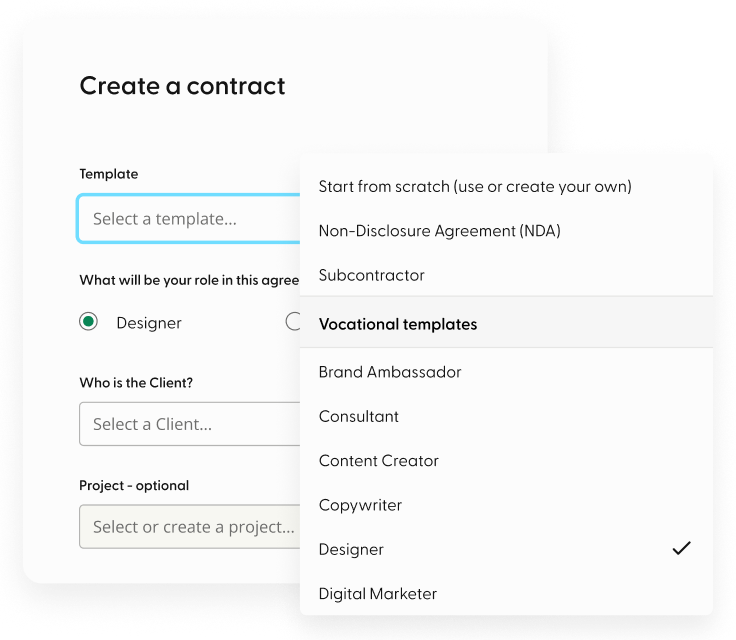Looking to create a custom contract for your business? Writing a custom contract for your business can be an intimidating process, but with the right know-how and research, it doesn’t have to be!
In this blog, we’ll give you valuable tips and tricks to help you create a custom contract that covers all the necessary aspects of your freelance business. We’ll also explore the benefits of using a contract builder and address the legality of contracts. So let's dive in and discover how you can create a custom contract that works for you!
Why Do I Need a Custom Contract?
Not all business have the same needs, which is why a custom contract can help you tailor the terms to your specific business.
Creating a custom contract is an essential part of running a business because it provides clarity and expectations, legal protection, and risk mitigation. It also creates a sense of professionalism and credibility when working with clients, leading to more trust between both parties.
Custom contracts can be created from scratch or by using a contract template, depending on what is best for you.
It’s important to remember that custom contracts must be written with precision and accuracy, so that they are legally enforceable and create no ambiguity between the two parties. Make sure all details are correct; by doing so, you can ensure that your business' best interests will be protected.
How Can I Create My Own Contract Template?
Creating a custom contract template for your freelance business is a great way to ensure clear communication and protect your interests. Here are some steps to help you create a custom contract template:
Identify your needs
Determine the specific requirements and terms you want to include in your contract. Consider factors such as project scope, deliverables, payment terms, intellectual property rights, confidentiality, dispute resolution, and termination clauses. Tailor these elements to your freelance business and the services you provide.
Research legal requirements
Familiarize yourself with the legal requirements for freelance contracts in your jurisdiction. While it's recommended to consult with a lawyer for specific legal advice, understanding general contract laws and freelance regulations can help you draft a comprehensive contract.
Gather sample contracts
Look for sample contracts related to your industry or freelance specialization. Online resources, professional organizations, or other freelancers might have templates you can use as a starting point. However, remember to customize the templates to suit your specific needs.
Write clear and concise clauses
Use simple language and avoid complex legal jargon to ensure your contract is easily understood by both parties. Break down each clause into clear sections, including headings and subheadings, to improve readability. Clearly define key terms and concepts to minimize ambiguity.
Include essential clauses
Customize the template by adding specific clauses that protect your interests. Some important clauses to consider include:
- Scope of work: Clearly define the services you'll provide, project timelines, and any deliverables or milestones.
- Payment terms: Specify the payment amount, payment schedule, accepted payment methods, and any late payment penalties or interest charges.
- Intellectual property rights: Clarify who will own the intellectual property rights for the work produced and whether there will be any licensing or transfer of rights.
- Confidentiality: Include a confidentiality clause to protect sensitive information shared during the course of the project.
- Termination: Outline the conditions under which either party can terminate the contract, including notice periods and any applicable termination fees or penalties.
- Dispute resolution: Determine the preferred method for resolving disputes, such as mediation or arbitration, and specify the jurisdiction for legal proceedings if required.
Seek legal review
Although creating a custom contract template can be a good starting point, it's highly recommended to have an attorney review your contract to ensure its legality and compliance with local laws. A lawyer can provide valuable insights and help you address any potential gaps or risks.
Regularly update your template
As your freelance business evolves and you gain more experience, it's essential to review and update your contract template regularly. This helps you incorporate any lessons learned, adapt to changes in your industry, and stay up-to-date with legal requirements.
Remember, while a custom contract template can provide a strong foundation, each client and project may require some modifications. Tailor your contract to suit the specific needs of each engagement, and always ensure that both parties review and sign the final agreement before commencing work.
What Are the Benefits of Using a Contract Builder?
Creating a custom contract for your business can be time-consuming and overwhelming. You need to make sure that all the essential elements are included in the agreement, as well as any other relevant areas such as dispute resolution and warranties. This way, you can ensure that your contract is legally enforceable and will protect both parties involved.
The good news is, contract builders makes the process much easier! Here’s the top 5 reasons why you should use a contract builder:
- Saves time: Contract builders provide pre-designed templates that can save you significant time and effort compared to creating a contract from scratch. You can simply select the relevant sections, clauses, and terms you need, and the builder will generate a comprehensive contract for you.
- Ensures all essential elements are included: A contract template can ensure all relevant information is included in the agreement, such as dispute resolution and warranties.
- Customization: Most contract builders allow you to customize the template to suit your specific needs. You can add or remove clauses, modify language, and tailor the contract to align with your freelance business and the particular project or client you're working with.
- Consistency and professionalism: Using a contract builder ensures consistency across your contracts. You can maintain a standardized format and structure, which helps convey a professional image to your clients. This consistency can also enhance clarity and reduce misunderstandings by providing a familiar format that both parties can easily understand.
- Guidance and explanations: Contract builders often provide helpful explanations and guidance along the way. They may include tooltips or notes that explain legal terms, suggest best practices, or provide examples of how to use certain clauses. This can help you better understand the contract content and make informed decisions while customizing it.
With a contract builder, you'll have peace of mind knowing that your agreement is properly secured and ready for use!
Plus, you'll save money on hiring a legal team since these builders also provide eSignature capabilities so you don't even have to leave your desk to sign contracts. So why wait? Get started today with our free contract template builder!
Are Contracts Legally Binding?
In short, yes, when two or more parties enter into a contract, they are bound by the terms and conditions outlined in the agreement. Contracts provide an effective way to quickly secure business dealings and protect everyone involved in the transaction.
If one party fails to fulfill its obligations as specified in a legally binding contract, the other party has the power to seek enforcement or damages through negotiation, mediation, or legal proceedings, depending on the terms of the contract and the applicable laws in the jurisdiction.
By taking the time to create and review legal contracts prior to signing them, you can ensure that your best interests will be secured.
How Can a Contract Builder Help You with Contract Management?
A contract builder can help you manage the legal contracts and professional agreements needed to protect your business. This includes documents such as non-disclosure agreements, service contracts, employment contracts, and more.
With a contract builder, these documents can be easily created and customized to fit the needs of each agreement. Here’s some other major ways a contract builder helps you easily manage contracts.
- Centralized storage: Contract builders often provide a centralized platform or repository where you can store and manage all your contracts in one place. This eliminates the need for physical paperwork or scattered digital files, making it easier to access and track your contracts.
- Contract tracking and reminders: Contract builders may include features to set reminders for key dates, such as contract expiration, renewal, or payment milestones. These reminders help you stay proactive and avoid missing important deadlines or obligations.
- Collaboration and sharing: Many contract builders facilitate collaboration by allowing multiple parties to review, edit, and comment on contracts within the platform. This streamlines communication and ensures that all relevant stakeholders have access to the latest contract information.
- Workflow automation: Some contract builders offer workflow automation capabilities, allowing you to automate certain contract management tasks. For example, you can set up automated approval processes, notifications, or document generation, reducing manual effort and improving efficiency.
By leveraging the contract management features offered by a contract builder, you can streamline your contract-related processes, enhance organization and efficiency, improve compliance, and mitigate risks associated with contract management.
How Can Indy Help?
Contract templates help you save time when creating your custom business contracts. They also ensure that all of the essential elements are included in your agreement.
Indy has ready-made contract templates you can use to protect your business (and you can create one in just minutes)! Here’s how:
- Choose a template: Choose the contract template you need and fill in your business details. That’s it! The Contract Wizard automatically updates the entire contract in seconds.
- Digital Assistant: Want to revise a section of a contract? The Digital Assistant can automatically generate content for the most critical sections of a contract, giving you a first draft that you can easily revise to fit your needs.
- Workflow Automation: You can set up automated actions. For example, when a client signs the contract, an invoice will automatically be created without you having to move a finger.
- E-signatures: Electronic signatures make it easy for you and your client to sign a contract, so you can start projects faster.
Our legally-vetted contract templates secure every aspect of your freelance business. Plus, Indy has invoices, proposals, to-do lists, and more, so you can manage your entire business in one place. Get started today for free!
Wrapping Up
Contract templates are a valuable tool for anyone who wants to ensure their agreements and transactions are legally binding. Not only do they provide the necessary information needed to create a contract, but they also save you time and money while providing peace of mind knowing all parties involved will be legally protected.
With Indy’s contract builder, contracts can be signed quickly without ever leaving your desk. Whether you’re looking to protect your interests or secure deals faster, using contract templates is an effective way to reduce guesswork and speed up the signing process. Get started today for free!




